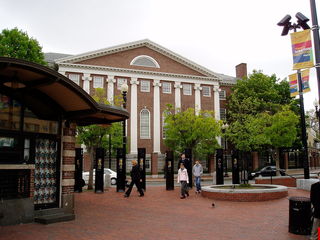Forgiveness
The Apocalyptic Cult of Cancel Culture
Forgiveness and redemption are out. Condemnation and excommunication are in.
Posted June 19, 2019 Reviewed by Gary Drevitch
Jordanian-American Natasha Tynes is an award-winning author who faced government prosecution in Egypt for her work defending free speech and a free press. In May, Tynes saw a Washington, D.C. Metropolitan Area Transit Authority (WMATA) worker eating on the train—something she understood to be prohibited for all riders. She asked the employee about it. The woman responded, “Worry about yourself.” Frustrated that she rides the Metro hungry in order to comply with the rules while someone she understood to have the power to ticket her for eating was not complying with the rules, herself, Tynes “tweet-shamed” the employee by writing a complaint to WMATA and posting it on Twitter along with a photo of the woman eating.
Horrible behavior? I’d say so. Disappointing to see someone behave that way? Sure. But in a world in which online shaming is the new norm, it’s not surprising. What is surprising is that less than 45 minutes after posting the tweet, Tynes deleted it, apologized for what she called a “short-lived expression of frustration,” and contacted WMATA to say it was an “error in judgment” for her to report the employee. She even asked that WMATA not discipline the employee.
But Twitter’s outrage machine turned on her. She became “Metro Molly.” The independent publishing company set to distribute her novel tweeted that Tynes had done “something truly horrible” and they had “no desire to be involved with anyone who thinks it’s acceptable to jeopardize a person’s safety and employment in this way.” Her publishing deal was canceled.
Does this seem like a high price to pay for a 45-minute lapse in judgment? Or even for acting like, well, a jerk?

Enter Kyle Kashuv, the conservative Parkland school shooting survivor who declined lucrative scholarship offers in order to attend Harvard University only to have his admission rescinded after schoolmates alerted the Huffington Post to some extremely offensive, racist, and antisemitic comments Kashuv (who is Jewish) made in a private online chat when he was 16 years old. Kashuv, now 18, apologized publicly and unequivocally, and acknowledged his misdeeds in a letter to Harvard’s admissions office. He even sent a separate a letter to Harvard’s diversity dean. As David French remarked in the National Review, Kahsuv did “everything we want a young man to do when he’s done something wrong.”
One might think that Harvard would relish the opportunity to educate a young man who seems to have an interest in being a decent and productive member of society but appears not to have had the benefit of growing up in an environment in which uttering racial slurs is unthinkable. What could be better for him than spending four years in a community in which the thinking that produces that kind of behavior is replaced with better thinking (producing better behavior)?
Imagine the success story Harvard could have told: Teen with racist past graduates from Harvard with a commitment to social justice. But as Robby Soave of Reason Magazine noted, instead, a “corrosive impulse to seek and destroy” resulted in Harvard’s decision, seemingly “an endorsement of the position that people should be shamed and punished for their worst mistakes as kids.” On the other hand, former university president Michael Nietzel thinks Harvard was right to rescind the admission. “The idea that Mr. Kashuv should not be held accountable for his behavior because he was only 16 just doesn’t cut it. … Harvard was reasonable to say that his choice had consequences.”
Zack Beauchamp of Vox thinks the political left and right don’t see eye to eye on this incident because the view from the right is “sympathetic” while the view from the left is “critical.” What he sees as the “conservative view of racism” approaches racism as a “personal failing.” According to this view, he says, people can overcome their racism by “striving not to let race affect the way (they) speak and act,” and “the real threat isn’t the racist comments themselves,” because they can be overcome, “but the impulse to punish people for them.” From this "sympathetic" perspective, penalizing everyone for their past transgressions leaves them no room to grow, and even opens up the possibility of punishing the innocent.
While the “conservative” view focuses on individual growth and development, what Beauchamp defines as the “liberal and leftist” view sees racism as “a structural problem”—less of a personal failing to be overcome and more “unshakable,” leading “even people who firmly believe in ideals of equal treatment to act or speak in prejudiced ways.” According to this view, he says, “Kashuv looks less like a kid who made youthful mistakes and more like a young man who’s trying to escape responsibility for his actions.”
But what’s the right price to pay? While Kashuv’s comments are certainly abhorrent, it does not appear that he has engaged in such behavior since. (One would imagine that his anonymous schoolmates who so helpfully provided the Huffington Post with the record of his misdeeds would have produced more recent evidence had there been any.) If he has not continued to engage in similar behavior, does the punishment fit the crime?
Despite Beauchamp's theory, it is not only people on the political right who find it difficult to support giving such harshly punitive consequences to a recent high school graduate who transgressed at age 16. Perhaps, then, this is not really a clash between liberal and conservative perspectives, but a difference between two paradigms: the apocalyptic and the prophetic.
Those on the political right might be more inclined than those on the left to see the world and its people as requiring reform and salvation, so it can appear to be a political difference. But it is an apocalyptic view, not a liberal one, that rejects redemption and forgiveness in favor of condemnation and excommunication. It is an apocalyptic perspective, not a liberal one, that sees the world as needing to be destroyed and replaced rather than improved and perfected. It is an apocalyptic paradigm in which history and its imperfect figures are irredeemable; in which, for example, part of the country represents not people who are struggling, but a “basket of deplorables.”
A prophetic culture seeks deliverance through historical persons, but Cancel Culture seeks apocalyptic deliverance through ahistorical means; without the help of morally polluted historical figures and without any of history’s contaminated tools. Jennifer Senior of the New York Times described it best when she wrote, “purity tests are the tools of fanatics, and the quest for purity ultimately becomes indistinguishable from the quest for power.” In Cancel Culture, the powerful don't give forgiveness, they take revenge.
“Think of people as people, not as abstractions,” writer Chimamanda Ngozi Adichie exhorted in her 2018 Harvard commencement speech. People are “fragile, imperfect, with prides that can be wounded and hearts that can be touched.” But an apocalyptic culture is not interested in wounded hearts. It wants to destroy, not heal. It wants retribution for moral impurities, not forgiveness for kids. And it uses the new tools of social media to accomplish its apocalyptic goals.
Anyone who says that what happens online doesn’t matter hasn’t been a target of Cancel Culture.
Yet. ♦
Pamela Paresky's opinions are her own and should not be considered official positions of the Foundation for Individual Rights in Education or any other organization with which she is affiliated.
References
Beauchamp, Z. (2019). The Kyle Kashuv-Harvard controversy, explained.
Soave, R. (2019). Harvard University Cancels Kyle Kashuv.
Senior, J. (2019). Teen Fiction and the Perils of Cancel Culture.
Nietzel, M. (2019). Harvard Was Right To Rescind Its Admission Offer To Kyle Kashuv.
Paul, D., and Bever, L. (2019). An author lost her book deal after tweeting about a Metro worker. She’s suing for $13 million.
French, D. (2019). Harvard Demonstrates Once Again That Post-Christian America Is Post-Forgiveness America.
Immense gratitude to Rabbi Everett Gendler for the conversation about the apocalyptic versus prophetic.




